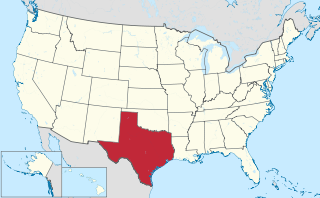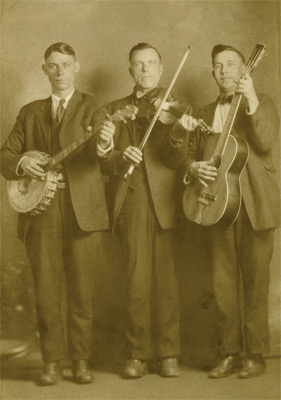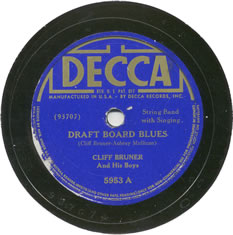Related Research Articles

James Robert Wills was an American Western swing musician, songwriter, and bandleader. Considered by music authorities as the founder of Western swing, he was known widely as the King of Western Swing. He was also noted for punctuating his music with his trademark "ah-haa" calls.

Cajun music, an emblematic music of Louisiana played by the Cajuns, is rooted in the ballads of the French-speaking Acadians of Canada. Although they are two separate genres, Cajun music is often mentioned in tandem with the Creole-based zydeco music. Both are from southwest Louisiana and share French and African origins. These French Louisiana sounds have influenced American popular music for many decades, especially country music, and have influenced pop culture through mass media, such as television commercials.

The U.S. state of Texas has long been a center for musical innovation and is the birthplace of many notable musicians. Texans have pioneered developments in Tejano and Conjunto music, Rock 'n Roll, Western swing, jazz, punk rock, country, hip-hop, electronic music, gothic industrial music, religious music, mariachi, psychedelic rock, zydeco and the blues.
Western swing music is a subgenre of American country music that originated in the late 1920s in the West and South among the region's Western string bands. It is dance music, often with an up-tempo beat, which attracted huge crowds to dance halls and clubs in Texas, Oklahoma and California during the 1930s and 1940s until a federal war-time nightclub tax in 1944 contributed to the genre's decline.

Music in the United States underwent many shifts and developments from 1900 to 1940. The country survived both World War I and the Great Depression before entering World War II in December 1941. Americans endured great loss and hardship but found hope and encouragement in music. The genres and styles present during this period were Native American music, blues and gospel, jazz, swing, Cajun and Creole music, and country. The United States also took inspiration from other cultures and parts of the world for her own music. The music of each region differed as much as the people did. The time also produced many notable singers and musicians, including jazz figure Louis Armstrong, blues and jazz singer Mamie Smith, and country singer Jimmie Rodgers.

A Tribute to the Best Damn Fiddle Player in the World is the eleventh studio album by Merle Haggard backed by The Strangers, released in 1970.

Clarence "Gatemouth" Brown was an American singer and multi-instrumentalist from Louisiana. He won a Grammy Award for Best Traditional Blues Album in 1983 for his album, Alright Again!.

Charles Cleveland Poole was an American musician, singer, banjo player, and leader of the North Carolina Ramblers, which was a string band that recorded many popular songs between 1925 and 1930.
"Cocaine Blues" is a Western swing song written by Troy Junius Arnall, a reworking of the traditional song "Little Sadie." Roy Hogsed recorded a well known version of the song in 1947.
"Corrine, Corrina" is a 12-bar country blues song in the AAB form. "Corrine, Corrina" was first recorded by Bo Carter. However, it was not copyrighted until 1932 by Armenter "Bo Carter" Chatmon and his publishers, Mitchell Parish and J. Mayo Williams. The song is familiar for its opening verse:

Clifton Lafayette Bruner was a fiddler and bandleader of the Western Swing era of the 1930s and 1940s. Bruner's music combined elements of traditional string band music, improvisation, blues, folk, and popular melodies of the times.

John Paul Gimble was an American country musician associated with Western swing. Gimble was considered one of the most important fiddlers in the genre. He was inducted into the Rock and Roll Hall of Fame in 1999 in the early influences category as a member of Bob Wills and His Texas Playboys.

Luderin Lawrence Darbone, was a Cajun-Western swing fiddle player for the band Hackberry Ramblers.

"Guitar Boogie" is a guitar instrumental recorded by Arthur "Guitar Boogie" Smith in 1945. It was one of the first recordings in the style later dubbed "hillbilly boogie" to reach a widespread audience, and eventually sold nearly three million copies. It was the first guitar instrumental to climb the country music charts, and then crossover and also gain high rankings on the popular music charts. "Guitar Boogie" has been interpreted and recorded by a variety of musicians. It is among the songs discussed as the first rock and roll record.
Willard "Ramblin'" Thomas was an American country blues singer, guitarist and songwriter. He is best remembered for his slide guitar playing and for several recordings he made in the late 1920s and early 1930s. Blues scholars seem undecided if his nickname referred to his style of playing or to his itinerant nature. He was the brother of the blues musician Jesse Thomas.

Old timefiddle is the style of American fiddling found in old-time music. Old time fiddle tunes are derived from European folk dance forms such as the jig, reel, breakdown, schottische, waltz, two-step, and polka. When the fiddle is accompanied by banjo, guitar, mandolin, or other string instruments, the configuration is called a string band. The types of tunes found in old-time fiddling are called "fiddle tunes", even when played by instruments other than a fiddle.
Westerns swing originated in the 1920s and 1930s; small towns in the US Southwest. Although sometimes subject to the term "Texas swing" it is widely associated with Tulsa, others contend that "Western Swing music finds deep roots in the dust bowl of Oklahoma", and its influences include jazz from the major urban centers of the United States. Its stylistic origins lie in Old Time, Western, blues, folk, swing, Dixieland and jazz. Writing in Rolling Stone, Dan Hicks described it as Texas-bred music grafted to jazz, or as "white country blues with a syncopated beat.".
Ida May Mack or Ida Mae Mack was an American classic female blues, country blues, and Texas blues singer and songwriter. She recorded eight songs in 1928, four of which she recorded twice. Six of these tracks were released at the time.
Joe Mullins is an American banjo player, vocalist, band leader, and radio broadcaster. He plays bluegrass and gospel music.
Shelly Lee Alley was an American singer, musician, songwriter and western swing bandleader. As a songwriter, Alley wrote "Travelin' Blues" for Jimmie Rodgers, a song which has been recorded by over 20 artists, including Merle Haggard and Ernest Tubb. He is a member of the Western Swing Hall of Fame. He is considered one of Texas' best bandleaders of the 1930s and 1940s and a pioneer of western swing music.
References
- ↑ Prince Albert Hunt's Texas Ramblers | Biography & History | AllMusic Retrieved 2018-04-12.
- ↑ Brown, Ron. "The Wild Life (and Death) of Terrell's Greatest Fiddler, Prince Albert Hunt". D Magazine. Retrieved 2020-11-13.
- 1 2 King, Christopher. "OCCURRENCE AT DEEP ELLUM". Oxford America. Retrieved July 9, 2015.
- ↑ Chadbourne, Eugene. "Prince Albert's Texas Ramblers - Biography". AllMusic . Retrieved July 8, 2015.
- 1 2 Palinski, Laurie (2012). Handbook to Texas Music. Texas State Historical Association. ISBN 9780876112977.
- ↑ "Prince Albert Hunt's Texas Ramblers". redhotjazz.com. Retrieved July 8, 2015.
- ↑ "Prince Albert Hunt". folkstreams.net. Retrieved July 8, 2015.